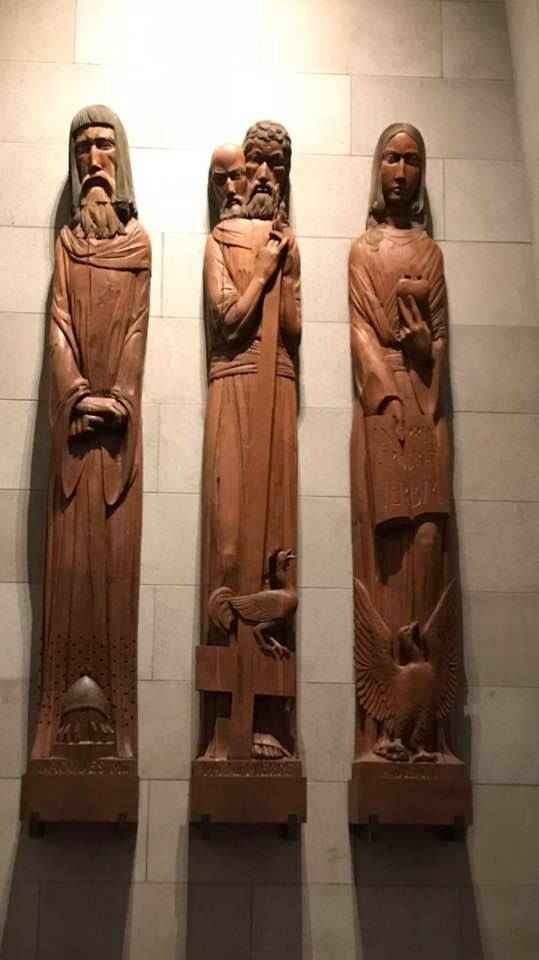What Should Belong to God?

Joke: There is an old story of the three traveling evangelists who were talking about how they dealt with the offerings that were collected during their evangelistic meetings. The first one said, “I draw a big circle on the ground, and then I throw the money in the air. Whatever lands inside the circle belongs to God, and whatever lands outside the circle belongs to me.” “Oh, I can do better than that,” said the second evangelist. “I put a coffee can in the middle of the floor. Then I throw the money in the air. Any money that lands inside the coffee can belongs to God, and I get to keep anything that lands outside.” Then the third evangelist grinned and said, “I’ve got you both beat. I just throw the money in the air, and whatever God wants, God takes!”
What belongs to God and what belongs to us? In today’s Gospel, in a short conversation, Matthew portrays a scene that Jesus is just and righteous, omniscient, The All-Knowing God, when he asks Pharisee’s disciples, “Whose image is [on the coin] and whose inscription [is it on the coin]?” Has Jesus ever seen the coin? After at least 30 years of living under Roman rule, we would believe that Jesus must have seen the coin and knew exactly who was on the coin, but why did he ask to see the coin? Who is the person in the coin and whose inscription is on the coin? This tells us that the coin belongs to Caesar, and this is exactly what Jesus pointed out, what belongs to Caesar gives it to Caesar, and God what belongs to God.
What is it that belongs to God then? Pharisees’s disciples say to Jesus, "Teacher, we know that you are a truthful man and that you teach the way of God following the truth.” They know that Jesus is a teacher, a truthful man, and he teaches following the truth; but why do they ask him about the tax? “Is it lawful to pay the census tax to Caesar or not?” It is lawful to pay tax, but is it what Jesus focuses our attention on? Listen to Jesus’ response, “Repay to Caesar what belongs to Caesar and God what belongs to God.” What belongs to God is to pay attention to God’s will rather than to turn our attention to the power of this world which is somehow so attractive to us and so attached to us.
What, then, is God’s will, we might ask? God’s will invites us to be aware of what’s going on in our life. Acknowledging the presence of God in our life, prophet Isaiah puts it so well in today’s first reading saying, “For the sake of Jacob, my servant, of Israel, my chosen one, I have called you by your name, giving you a title, though you knew me not. It is I who arm you, though you know me not, so that toward the rising and the setting of the sun people may know that there is none besides me.” Everything you have of what you are and who you are, I give them to you. Therefore, you shall worship no other gods besides me. Everything we have and who we are, God loves us and gives it to us. Therefore, what we should repay the Lord is our whole being of who we are and what we are. Shouldn’t we ask God, is it lawful to pay tax? Or rather, we should ask ourselves, what shall we repay you, Lord? To pay tax according to the laws is a must as all good citizens do, but it is much more important to follow God’s will to repay to him what belongs to him.
Acknowledging the presence of God in our life, is it enough of God’s will? Saint Paul beautifully teaches us in today’s second reading saying, “Our gospel did not come to you in word alone, but also in power and in the Holy Spirit and with much conviction.” Acknowledging God’s will will be completed when we live God’s will with conviction. What St. Paul convicted if it’s not, with courage and strength, to use his time, talent, and treasure, which belongs to God, to pay to God what belongs to him.
This weekend is a World’s Mission Sunday. We are invited to pray for those missionary people who respond to God’s will by going out of themselves to serve those unfortunate around the world. We are also called to help them financially in their missions. How can we be convicted to follow God’s will when we only use our time to build a better house for ourselves, to have a better car for ourselves, to have a better condition of living for ourselves, and to enjoy life ourselves with our loved ones alone? St. Paul’s conviction in following God’s will by spreading the good news to others, and sharing his time, talent, and treasure to bring people to come to know God. Have you ever been convicted of following God’s will? How would you be convicted of following God’s will? Would you be convicted to follow God’s will when you only use your talents for the good of yourselves and your loved ones? Would you be convicted to follow God’s will when you only use your treasure for the sake of your purpose and the benefit of your loved ones? Jesus says, “Repay to Caesar what belongs to Caesar and to God what belongs to God.” What is it that belongs to God if it’s not our time, talent, and treasure? What would be your time, talent, and treasure that should belong to God? Would there be anything that we have and who we are that belongs to God? How would you and I repay God who brings us into existence, continues to keep us in existence by providing us the fresh air to breathe every moment of our lives, and continues to bless us with many blessings all the days of our lives? The decision is yours.









